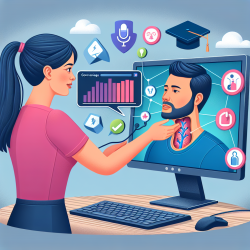Feeling lost in the intricate labyrinth of Individualized Education Program (IEP) planning and meetings is a sentiment familiar to many Speech Language Pathologists (SLPs). The path can seem winding and fraught with challenges, yet it's a journey we embark on with a single, unwavering goal: to advocate for and support the kids we serve. As someone who has navigated these waters both in the educational setting and through the lens of online therapy services like TinyEYE, I've seen firsthand the transformative power that comes from stepping into these meetings prepared, empowered, and inspired.
IEP meetings, while sometimes daunting, are pivotal moments in the educational journey of the children we work with. They are the crossroads where therapy goals align with educational objectives, ensuring that kids receive the support they need to thrive academically and socially. However, the process can feel overwhelming, especially when trying to balance the clinical aspects of our role with the administrative and collaborative demands of IEP planning.
The first step in demystifying this process is understanding the importance of preparation. As SLPs, our expertise in language and communication uniquely positions us to articulate the needs of our students in ways that are both compelling and accessible to parents, teachers, and administrators. This means diving deep into our assessments, therapy notes, and progress reports to gather evidence that supports our recommendations. It's about painting a picture of the child's current abilities, their potential for growth, and the specific interventions that will help them get there.
But preparation goes beyond just having the facts at your fingertips. It's also about anticipating the needs and questions of the IEP team members. This can include everything from understanding the curriculum requirements to recognizing the resources available within the school or district. By stepping into the meeting with a solutions-oriented mindset, you can lead discussions towards constructive outcomes, rather than getting bogged down in limitations or constraints.
Communication is, unsurprisingly, at the heart of successful IEP planning and meetings. This doesn't just mean speaking clearly and confidently about your recommendations. It also involves active listening, empathy, and the ability to facilitate dialogue between all parties. Remember, IEP meetings can be just as overwhelming for parents and guardians as they are for us professionals. By creating an environment where everyone feels heard and valued, you can foster a sense of collaboration and mutual respect that ultimately benefits the child.
One of the unique challenges—and opportunities—presented by online therapy services like TinyEYE is the need to adapt these communication strategies to a virtual setting. While the medium may change, the principles remain the same. Ensuring clear, concise, and frequent communication with teachers and parents is crucial. Utilizing video calls, emails, and online platforms can help maintain the personal connection and immediacy that are so vital to effective collaboration. Moreover, these tools can offer innovative ways to involve the child in their own IEP process, empowering them to take an active role in their education and therapy.
Adaptability is another key trait for SLPs navigating IEP planning and meetings. The needs of our students are constantly evolving, as are the educational landscapes we operate within. Being open to new ideas, whether it's integrating technology into therapy sessions or exploring alternative assessment methods, can lead to more personalized and effective IEPs. This adaptability also means being prepared to advocate for your students in situations where resources may be limited or traditional approaches may not be working. It's about finding creative solutions that ensure every child has the opportunity to succeed.
Finally, it's essential to approach IEP planning and meetings with a sense of inspiration. Yes, the process can be complex and challenging, but it's also an opportunity to make a profound difference in the lives of the kids we serve. Each meeting is a chance to advocate for their needs, celebrate their progress, and contribute to a plan that will support their growth and development. By keeping the focus on the positive impact of our work, we can navigate the IEP maze with confidence and purpose.
In closing, IEP planning and meetings are a crucial aspect of our role as Speech Language Pathologists. By preparing thoroughly, communicating effectively, adapting to change, and approaching our work with inspiration, we can overcome the challenges and embrace the opportunities these meetings present. Remember, at the heart of every IEP is a child with unique needs, talents, and potential. It's our privilege and responsibility to advocate for them, ensuring they receive the support they need to thrive. Together, with patience, empathy, and expertise, we can guide them through their educational journey, making a lasting difference in their lives and in the world.










